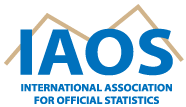This is a great time of challenge for everyone, demonstrating just how connected we are across the world both in our vulnerability and in our strength.
The first priority at such a time is to keep safe and to continue to support our colleagues and their families. Despite the inability to travel, I have seen an upsurge in contact between IAOS members. Many are extremely busy in high pressure situations providing the evidence necessary for their governments and communities to make good decisions in the face of uncertainty and high risk to life as well as economic and social upheaval. The breadth and depth of our support network will be of critical importance in the weeks and months ahead.
A wide range of resources has been developed for use by official statisticians. The UN resource (https://covid-19-response.unstatshub.org/) provides a good way in to explore what is available alongside regional and local hubs such as the Africa UN knowledge hub for Covid-19 (https://knowledge.uneca.org/covid19/ ) and professional gateways such as the one developed by the ISI (https://www.isi-web.org/index.php/covid-19 ). A very challenging issue for many countries is how to proceed with census plans (https://unstats.un.org/unsd/demographic-social/census/COVID-19/).
Whilst in some countries official statisticians are in high demand and actively engaged in supporting their governments (such as New Zealand and UK) in others the NSI is shut and there is a risk of gaps in critical data (such as CPI) as the crisis develops. The position in parts of Africa is especially difficult.
As far as the activities of the IAOS are concerned, despite the postponement of the Zambia conference ( 2020 IAOS-ISI Conference in Zambia Postponed), we are proceeding with a special Africa issue of the Journal. The June issue will highlight the statistical response to the Covid-19 pandemic. We have also started a discussion on official statistics in the context of the Covid-19 crisis (https://officialstatistics.com/news-blog/crises-politics-and-statistics). This discussion will help us gather ideas about the wider implications for official statistics in terms of the statistical service needed, use of emerging data sources and coordination at the international level. Encouragement for our community to step up has come from the United Nations Deputy Secretary General, Amina Mohammed in her address to the Global Partnership for Sustainable Development Data Board (http://www.data4sdgs.org/news/un-deputy-secretary-general-participates-data4sdgs-meeting-board).
Since my last message we have been able to continue our activities in one way or another. Our strategy for 2019-21 was agreed and published following consultation (Strategy ); a moving tribute to Jorge Todesca, former Chief Statistician of Argentina, who died in February, was written by our founding President, Jean-Louis Bodin (In Memoriam: Dr Jorge Todesca ); and many IAOS members attended the United Nations Statistical Commission (one of the last meetings to take place before so many of us have been locked down). Former IAOS President, Shigeru Kawasaki was elected as Chair ( https://unstats.un.org/unsd/statcom/51st-session/bureau/ ) and did a great job steering the meeting through a long and complex agenda. In addition, I had the opportunity in January to join Prof Samuel Annim and his team for the launch of the Ghana Statistical Service corporate plan (https://statsghana.gov.gh/gssmain/storage/img/GSS%20Corporate%20Plan%202020_2024.pdf )
IAOS friends will also be interested to see the attached report published on 20 March by the US State Department on human rights practices for Greece ( https://www.state.gov/reports/2019-country-reports-on-human-rights-practices/greece/ ) which helpfully highlights the still ongoing case of Andreas Georgiou in the section related to respect for the integrity of the person: denial of fair public trial. The American Statistical Association has also once again drawn attention to the continuing concerns about his case ( https://www.amstat.org/ASA/News/Appeal-Hearing-Delayed-for-Greeces-Andreas-Georgiou.aspx ).
We had hoped to showcase our Young Statisticians Prize winners at the Zambia conference. Along with so many other things, that opportunity is now delayed but I would like to take this opportunity to announce who they are and be the first to offer congratulations to the prize winners:
- Kenza Sallier (StatCan): Toward More User-Centric Data Access Solutions: Producing Synthetic Data of High Analytical Value by Data Synthesis
- Johannes Gussenbauer and Mr. Gregor de Cillia (Statistik Austria): The R-Package surveysd: Estimating standard errors for Complex Surveys with a Rotating Panel Design
- James Bailie (Australian Bureau of Statistics): Big Data, Differential Privacy and National Statistical Organisations
Also, congratulations to the winner of the special commendation for a paper from a developing nation:
- Madi Mangan (The Gambia Bureau of Statistics): Household Consumption Allocation and the Collective Household Model: Children Share of Household Resources in The Gambia
Finally, a big Happy Birthday to Florence Nightingale who remains, 200 years since her birth, such an inspiration to all who work in nursing and in statistics.
The IAOS Annual report for 2018-19 is available here. The report will be discussed at the Annual General Meeting which will be scheduled once the position with Covid-19 is clearer. In the meantime, if you have comments on it please email them to contactiaos@gmail.com.
John Pullinger

